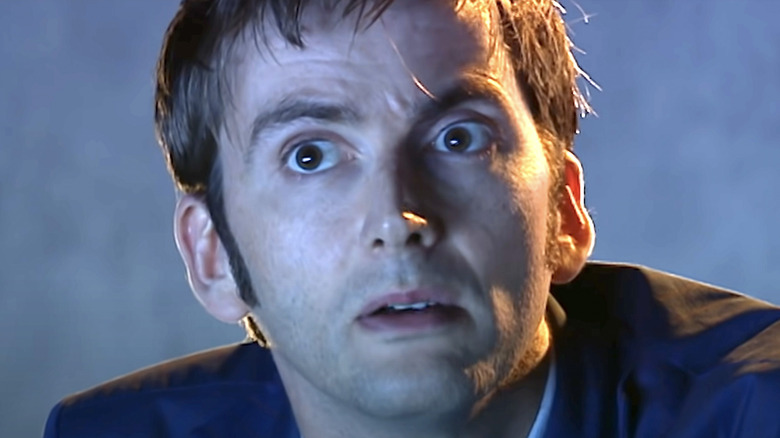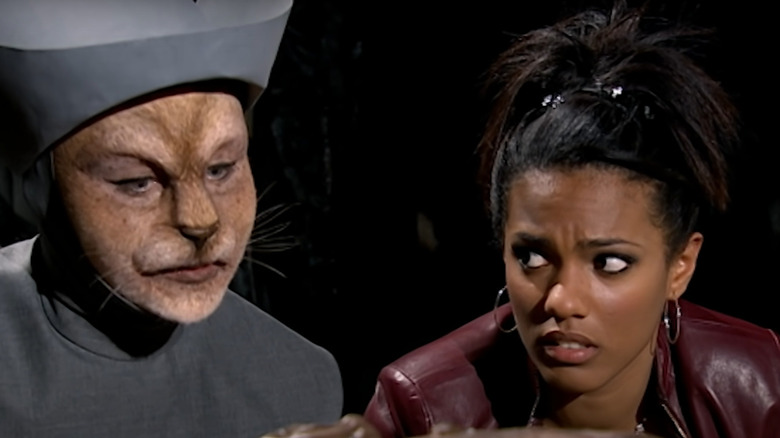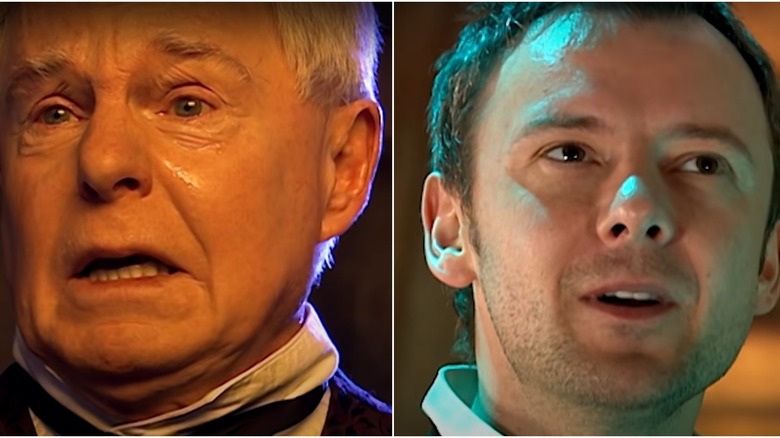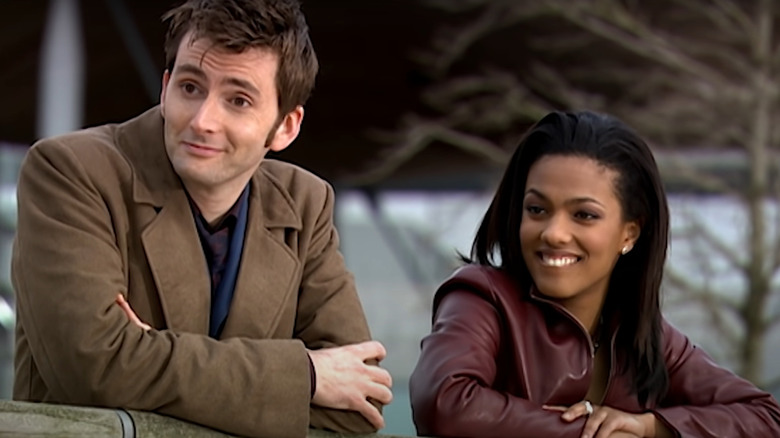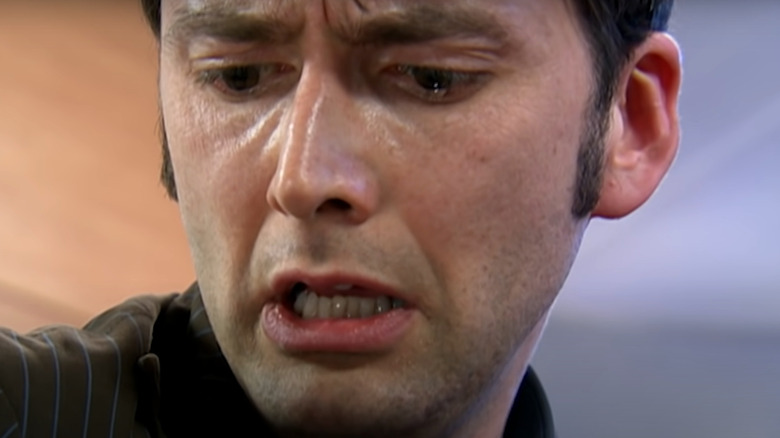The Ending Of Doctor Who Season 3 Explained
BBC's "Doctor Who" is not the kind of story that can be explained easily. Yes, it's a science fiction series, and exposition as dense as a neutron star (stay in school kids) comes with the territory. But the tale of the Doctor is determined to keep things interesting — and here, interesting is a word that means rigorous and near-constant retcons to the lore. Though, such difficulties are almost to be expected from a production that's primary concept is centered around a time-traveling demigod.
The third season (or series, if you're British) of "Doctor Who" stars David Tennant as the Tenth Doctor. In the series, the Doctor frequently, canonically changes his face. BBC learned from the mistakes of "James Bond" and changes the game drastically with the constant introduction of new ideas and new characters. For those who are curious but confused, here's our primer for where BBC takes the lonely Time Lord by the end of "Doctor Who" Season 3.
A quick space opera refresher course
Let's start with a brief summary of what comes before. At the end of Season 2, and for reasons best left to a different explanation article, the Doctor (David Tennant) is forced to leave his love Rose Tyler (Billie Piper) in a parallel universe with a human copy of himself. The bulk of Season 3 follows the Doctor and his travels with Martha Jones (Freema Agyeman), a medical student who helps him save a hospital that is teleported to the moon by cranky, rhinoceros people. Martha, like most of the new companions, falls instantly and deeply in love with the Doctor, who doesn't reciprocate in the slightest. He basically tells Martha that she's a rebound companion, which only makes her more desperate to win his affection. She proves herself over and over on their travels, but he never gives her anything more substantial, not even to cement a solid friendship.
The three-part finale of Season 3 sees the Doctor and Martha running into Captain Jack (John Barrowman) when he accidentally crashes the TARDIS into the end of the universe. The trio then meets Yana (Derek Jacobi), an elderly man helping the dying remnants of humanity escape into the stars. But meeting the Doctor unearths hidden memories in Yana, who rediscovers that he is the Master, a Time Lord who previously opposed the Doctor many years ago (before the 2005 BBC reboot). With his mind partially intact — he's never fully sane, not really — the Master steals the TARDIS, regenerates into a new, younger form, then leaves the Doctor, Martha, and Jack stranded at the end of the universe. Fortunately, Jack has a Vortex Manipulator (read: handy plot device) that returns them home, which is now the Master's home too.
The Master returns as the Doctor's nemesis
Under the guise of his new regeneration, the Master is Harold Saxon (John Simm), the latest prime minister of present-day London. Contextually, he appears shortly after Harriet Jones (Penelope Wilton) vacates the position, and references to his presence can be spotted throughout the third season. The Master transitions from politician to galactic dictator with the polished ease of someone who's been binge-reading "Superman" comics just for the Lex Luthor bits. That's not an outlandish comparison, either, because this version of the Master permanently transforms "Doctor Who" into a superhero TV show.
Within a few short episodes, the Master hypnotizes the entire human population with hijacked cellphones. He unleashes an army of murderous minions to slaughter a 10th of humanity. He takes Martha's family and forces them into slavery. He repeatedly kills Jack, who just can't seem to stay dead, for fun. He imprisons and forcefully ages the Doctor. He craves the Doctor's attention and approval, and he's desperate to outperform him. He's also clinically a sociopath. How is the Master anything other than a supervillain? He is Lex Luthor, he is the Joker, he is the villain the hero refuses to kill, and that choice will always lead to suffering.
Martha's metric for self-worth drastically improves
If the Master is the nemesis that the Doctor deserves, Martha is the companion that he doesn't. Notably absent from the Master's list of tortured prisoners, Martha spends most of the finale on a phenomenal exploit that deserves infinitely more screen time than it actually gets. She travels the world for an entire year on a mission for the Doctor, dutifully pressing forward under the Master's deadly, dictatorial nose. Her success gives the Doctor a psychic Tinker Bell boost when everyone on the planet thinks of him at once. With that psychic energy, the Doctor turns the tides against the Master and ultimately reverts time to how it should be. It makes as much sense as it sounds like it does.
Martha gets to remember the year that never was. She gets to remember how she travels the continents, constantly fearing for her life, always alone, forever promising the Doctor's return. Martha proves her mettle and comes out stronger, more confident, and more certain of herself. In that year, she realizes what she can accomplish without the Doctor, and what her service on the ground could mean for humanity. It's no surprise then that she bids him goodbye at the end of "Doctor Who" Season 3, citing a definitive purpose on Earth.
The Doctor is alone again
"Doctor Who" Season 3 is a violent transitionary phase for the Tenth Doctor and all who accompany him, because the person who he becomes the Tenth Doctor for, Rose Tyler, is no longer in his life. He gains a host of new enemies and cycles rapidly through companions and rarely tends to the emotional wellbeing of anyone, let alone himself. Season 3 also ends the primary arcs of both Martha Jones and Jack Harkness. Martha moves on from her unrequited love, and the mystery of Jack is solved when the Doctor realizes that he will become the Face Of Boe. While both appear briefly in later episodes — Jack more than Martha — their time of needing the Doctor is over.
Yet, the Doctor's time of needing them has only just begun, because as much as he insists that he is better off alone, he desperately searches for companionship, even amongst his rivals, which is why he mourns the Master's (annoyingly temporary) death so deeply. It's best to think of Season 3 as the beginning of the end for the Tenth Doctor, as he only sinks further into a dark spiral as he stumbles across the cosmos.
